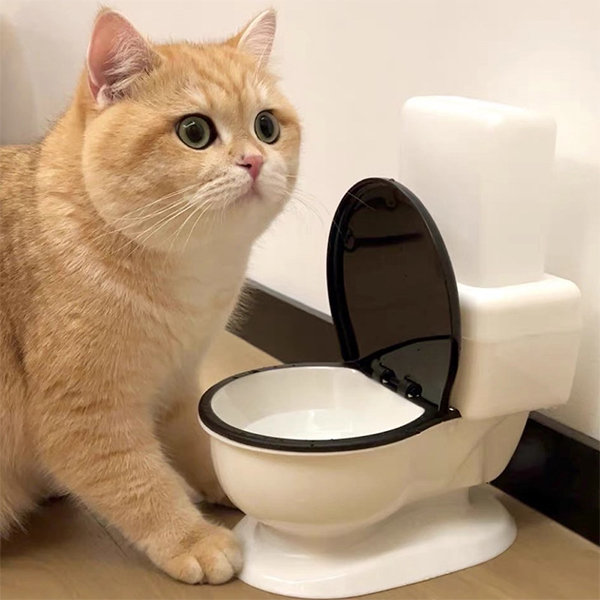Avoid Toilet Disasters: Don't Flush Cat Poop Down Your Toilet - Professional Advice
Avoid Toilet Disasters: Don't Flush Cat Poop Down Your Toilet - Professional Advice
Blog Article
We have noticed this great article pertaining to Don’t flush cat feces down the toilet directly below on the net and decided it made good sense to discuss it with you on this page.

Intro
As feline proprietors, it's vital to be mindful of how we take care of our feline good friends' waste. While it may appear convenient to flush pet cat poop down the bathroom, this technique can have harmful effects for both the environment and human health and wellness.
Ecological Impact
Flushing feline poop presents harmful pathogens and parasites right into the water, posing a considerable danger to marine ecological communities. These contaminants can negatively impact marine life and compromise water quality.
Health Risks
In addition to environmental problems, purging pet cat waste can additionally present health and wellness dangers to humans. Cat feces might contain Toxoplasma gondii, a parasite that can create toxoplasmosis-- a potentially serious ailment, specifically for pregnant females and individuals with weakened body immune systems.
Alternatives to Flushing
Thankfully, there are more secure and extra liable means to dispose of cat poop. Take into consideration the adhering to choices:
1. Scoop and Dispose in Trash
The most usual method of throwing away cat poop is to scoop it into an eco-friendly bag and toss it in the trash. Make sure to make use of a dedicated litter scoop and throw away the waste promptly.
2. Usage Biodegradable Litter
Opt for biodegradable cat trash made from materials such as corn or wheat. These trashes are environmentally friendly and can be safely gotten rid of in the trash.
3. Bury in the Yard
If you have a yard, consider hiding pet cat waste in an assigned area away from veggie yards and water sources. Be sure to dig deep adequate to stop contamination of groundwater.
4. Set Up a Pet Waste Disposal System
Invest in a pet dog garbage disposal system specifically made for feline waste. These systems use enzymes to break down the waste, lowering odor and environmental impact.
Conclusion
Responsible pet dog possession expands past offering food and shelter-- it also entails correct waste administration. By refraining from purging pet cat poop down the bathroom and choosing alternative disposal approaches, we can reduce our environmental impact and safeguard human health.
Why You Should Never Flush Cat Poop Down the Toilet
A rose by any other name might smell as sweet, but not all poop is created equal. Toilets, and our sewage systems, are designed for human excrement, not animal waste. It might seem like it couldn’t hurt to toss cat feces into the loo, but it’s not a good idea to flush cat poop in the toilet.
First and foremost, assuming your cat uses a litter box, any waste is going to have litter on it. And even the smallest amount of litter can wreak havoc on plumbing.
Over time, small amounts build up, filling up your septic system. Most litter sold today is clumping; it is made from a type of clay that hardens when it gets wet. Ever tried to scrape old clumps from the bottom of a litter box? You know just how cement-hard it can get!
Now imagine just a small clump of that stuck in your pipes. A simple de-clogger like Drano isn’t going to cut it. And that means it’s going to cost you big time to fix it.
Parasitic Contamination
Believe it or not, your healthy kitty may be harboring a nasty parasite. Only cats excrete Toxoplasma in their feces. Yet it rarely causes serious health issues in the cats that are infected. Most people will be fine too if infected. Only pregnant women and people with compromised immune systems are at risk. (If you’ve ever heard how women who are expecting are excused from litter cleaning duty, Toxoplasma is why.)
But other animals may have a problem if infected with the parasite. And human water treatment systems aren’t designed to handle it. As a result, the systems don’t remove the parasite before discharging wastewater into local waterways. Fish, shellfish, and other marine life — otters in particular — are susceptible to toxoplasma. If exposed, most will end up with brain damage and many will die.
Depending on the species of fish, they may end up on someone’s fish hook and, ultimately on someone’s dinner plate. If that someone has a chronic illness, they’re at risk.
Skip the Toilet Training
We know there are folks out there who like to toilet train their cats. And we give them props, it takes a lot of work. But thanks to the toxoplasma, it’s not a good idea.

I recently found that article about How to Dispose of Cat Poop and Litter Without Plastic Bags while browsing the internet. Please take the opportunity to share this blog posting if you appreciated it. Kudos for your time. Don't forget to pay a visit to our site back soon.
Click Here Report this page